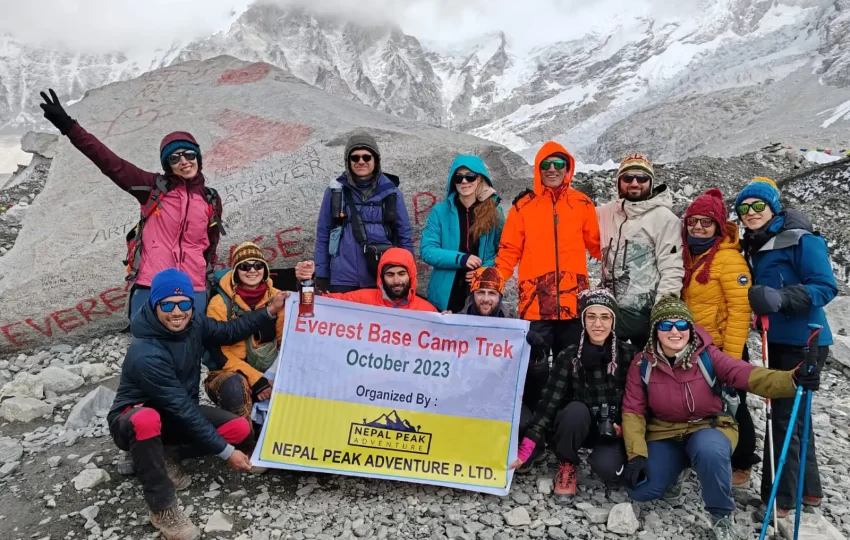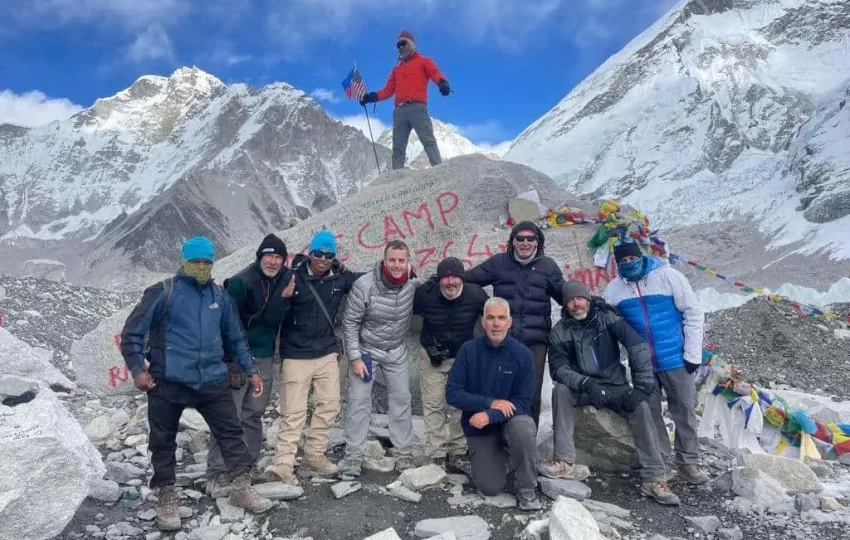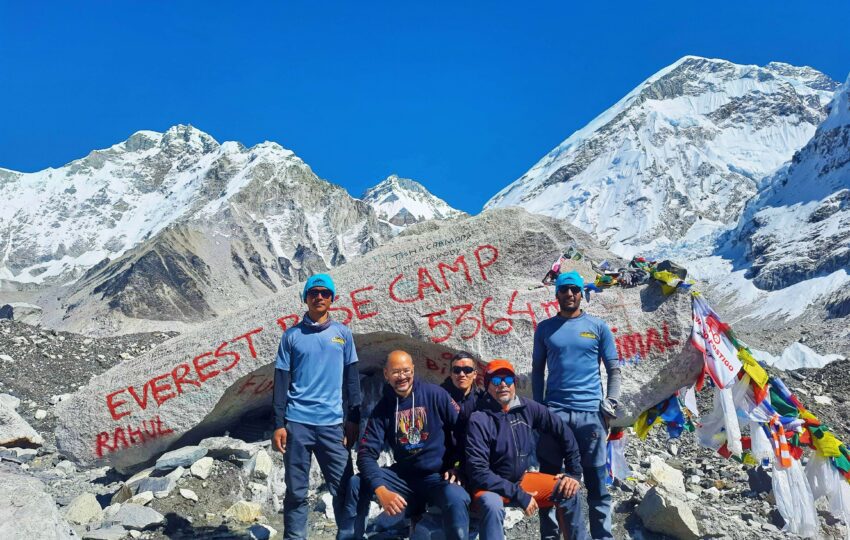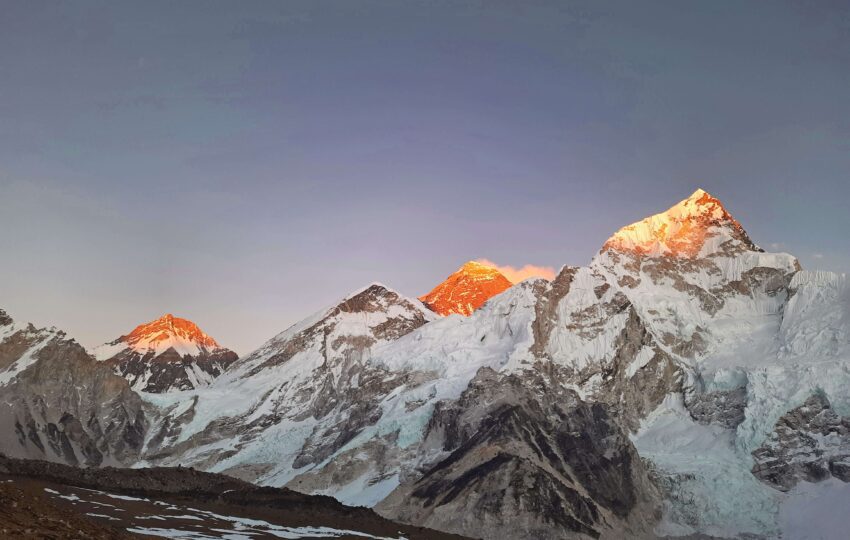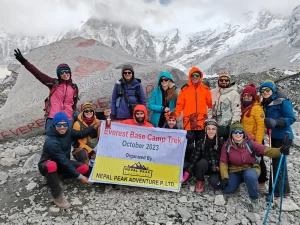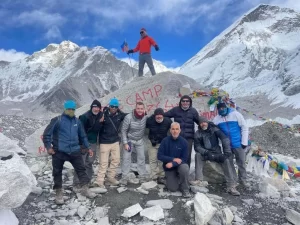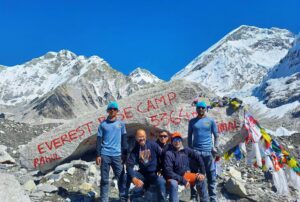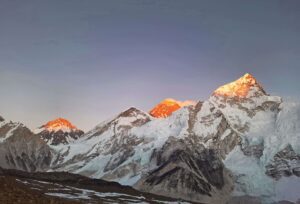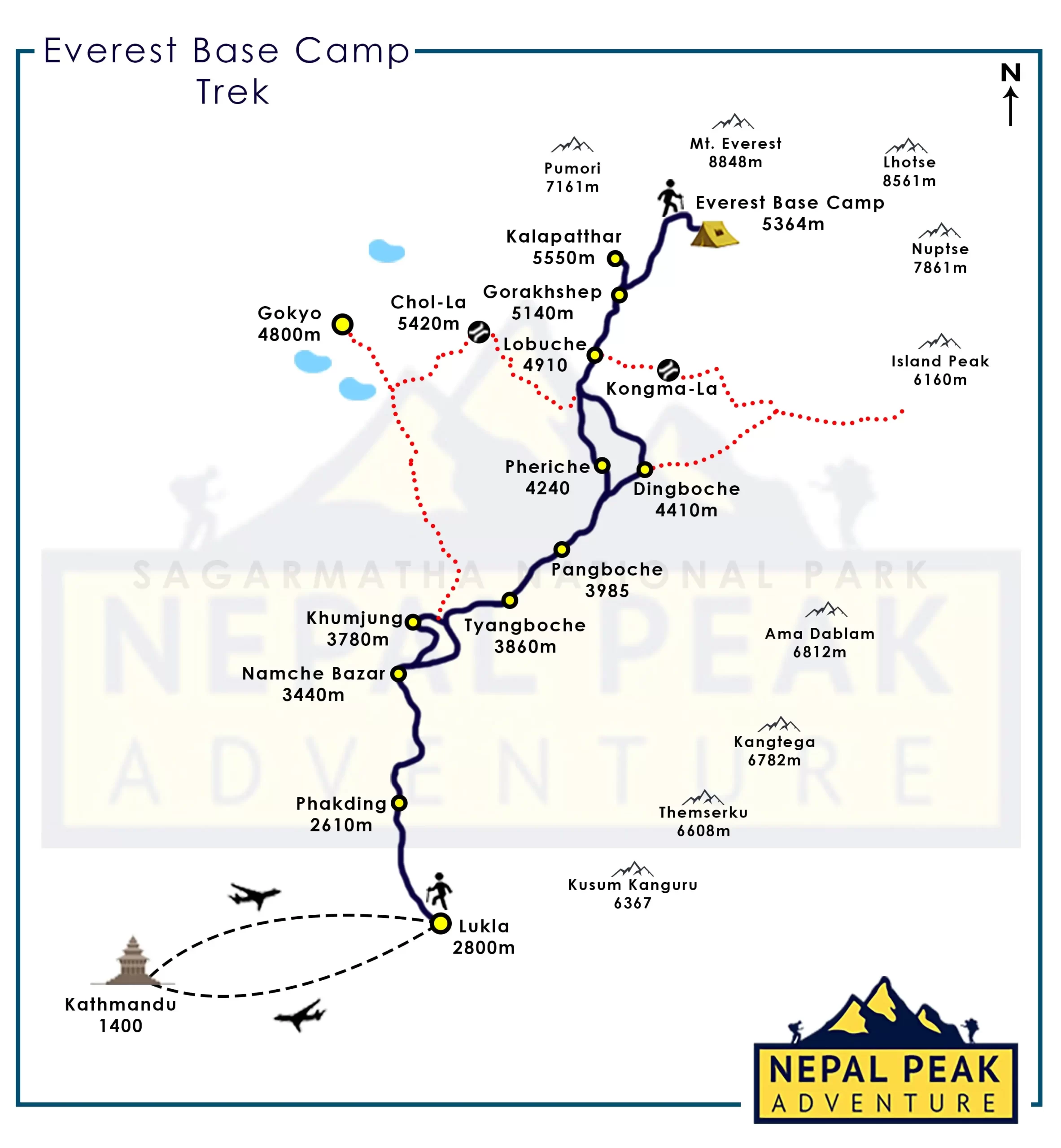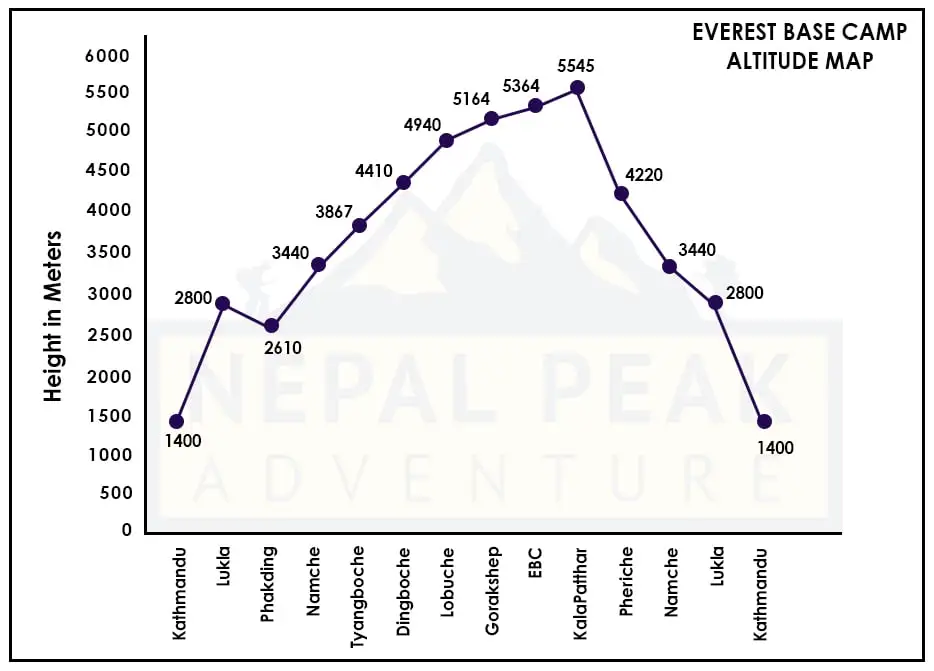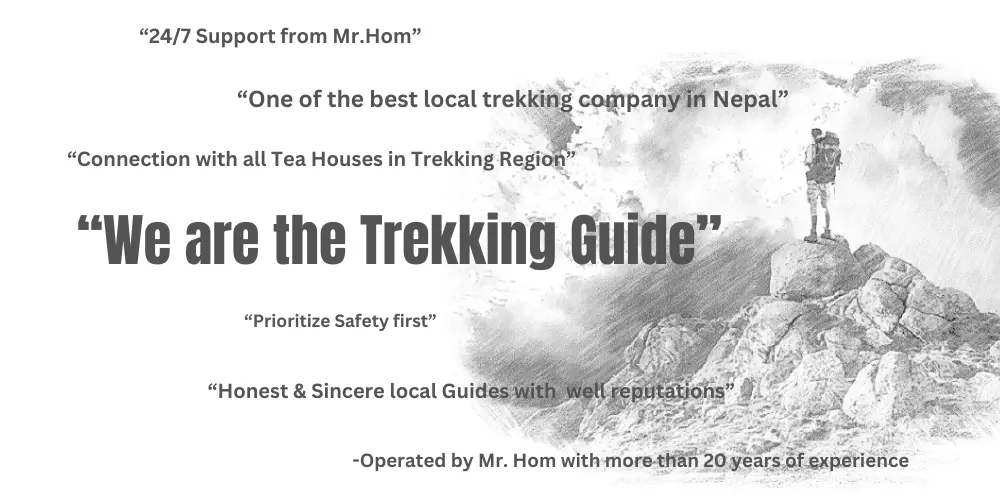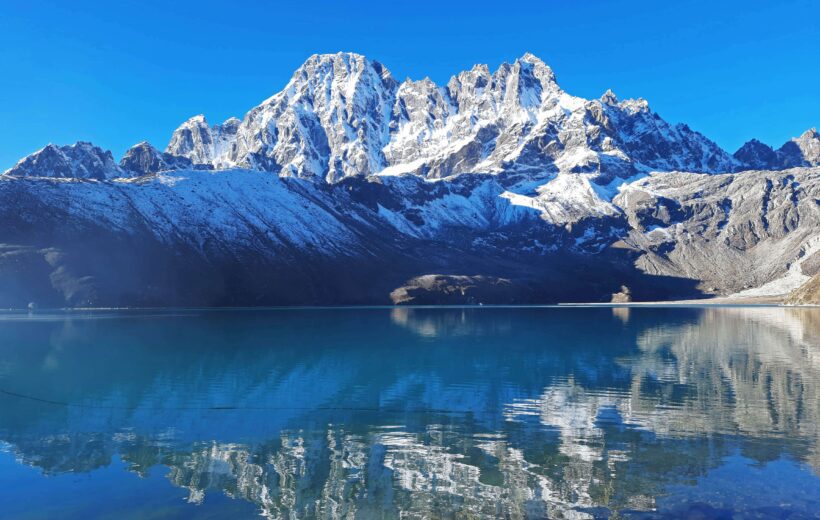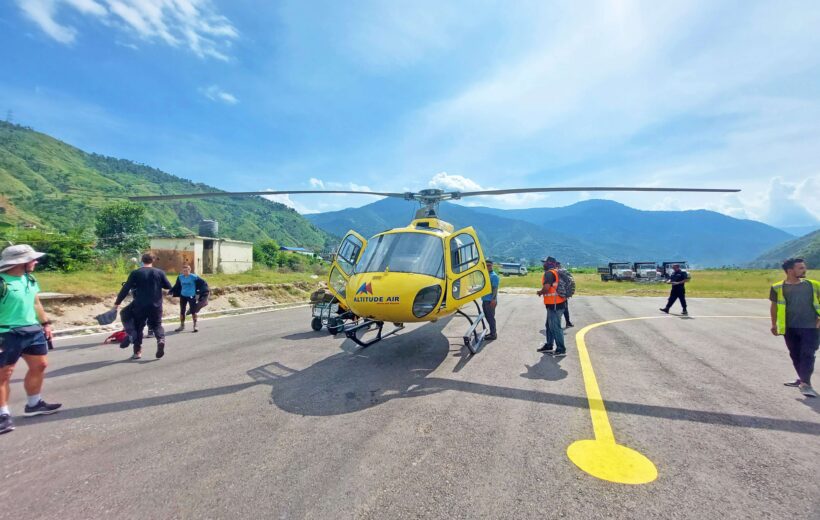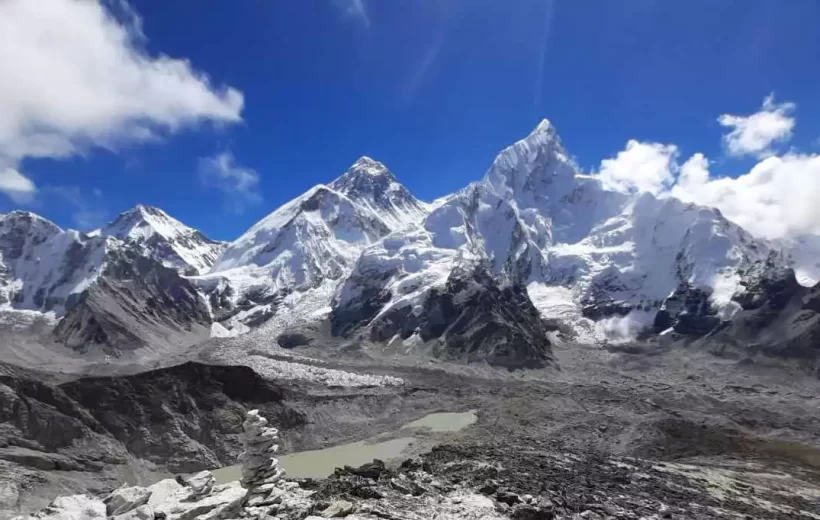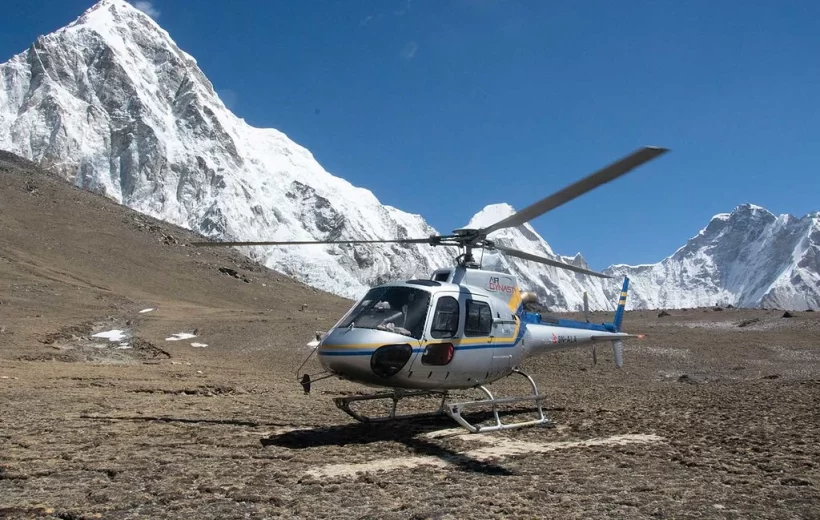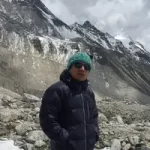Are you ready for a big step to adventure, to do the Everest Base Camp Trek in Nepal this year? Do not worry, because we've got your back and we present you the 14 Days Itinerary EBC package.
Everest Base Camp is indeed a high-altitude trek, 5,364 meters (17,598 ft) above sea level, and one of the most challenging treks in Nepal. Despite the challenge, thousands of trekkers travel to Nepal every year for this trek, and many have done so. So, why not join us now for this epic adventure to the Nepal Himalayas?
Overview of the Trek:
The trek offers an awe-inspiring view of giants including tallest mountain in the world - Mount Everest 8,849m, Mount Lhotse 8,516 m, Mount Cho Oyu-8,201 which makes it worth watching once in a lifetime.
Beyond the magnificent mountain vistas, the trek also takes you through a diverse landscape that includes beautiful rivers, charming Sherpa villages, strongest peoples on Earth, and enchanting alpine forests.
Each step along the trail unveils new natural wonders and scenic beauty that will leave you in awe.
As you venture deeper into the trek, you will have the privilege of exploring the Sagarmatha National Park which is one of the UNESCO World Heritage sites. And this protected area is a sanctuary for a variety of endangered wildlife, such as the elusive red panda, the elusive snow leopard, and the graceful blue sheep.
Spotting these remarkable creatures in their natural habitat adds an extra layer of excitement and wonder to your journey except Snow Leopard in close distance.
Similarly, the Everest Base Camp Trek not only captivates you with its natural grandeur but also immerses you in a rich tapestry of Sherpa culture and traditions.
You may not know, but the Sherpa people have a long and storied history, serving as expert guides and mountaineers for generations.
Even during your trek, you will have the opportunity to interact with Sherpa communities, learn about their customs, and witness their enduring traditions firsthand. This cultural exchange adds depth and meaning to your experience, fostering a deeper connection with the people and the land.
Everest Base Camp Trek Major Highlights
- Breathtaking Views of Everest and other Himalayan peaks.
- The warm hospitality and unique traditions of the Sherpa people.
- Namche Bazaar: Bustling Sherpa town and its vibrant markets.
- Tengboche Monastery: An ancient Buddhist monastery amidst majestic mountains.
- Everest Base Camp: Stand at the base of the world's highest peak.
- Kala Patthar: Highest viewpoint
- Sagarmatha National Park: A UNESCO World Heritage Site.
- Scenic flight into Lukla, the gateway to Everest.
- Enjoy a physically and mentally fulfilling journey.
Services Included in Everest Base Camp Trek Package:
Our Everest Base Camp Trek package for 14 days includes all the expenses such as permits, accommodations, meals, experienced guides, porters, and necessary transportation throughout the trek to ensure a seamless and rewarding journey to the iconic Everest Base Camp. Here is what is included in the package in detail.
- Upon Arrival, Airport Pick-up and transfer to your hotel on a Private Vehicle.
- Welcome dinner in a reputed Restaurant with a Live Nepali Cultural Program.
- 2 Nights Stay at star standard accommodation based on twin sharing in Kathmandu with Bed and breakfast.
- Kathmandu to Lukla & Lukla to Kathmandu flight fare (When operated from Kathmandu Airport).
- Ramechhap to Lukla & Lukla to Ramechhap Flight fare (When operated from Ramechhap Airport).
- Transportation Service for Ramechhap from Kathmandu & Ramechhap to Kathmandu.
- All Airport tax and Domestic transfers are provided.
- Night Stay at Teahouse/Mountain Lodge accommodation during the trek | 5 nights with attached bathroom service (1-night Phakding, 3 nights Namche, 1 night Lukla) | 6 Nights common room based on twin sharing on other days during the trek.
- Free 5 Hot Shower services when staying in tea houses during the trek at Phakding, Namche, and Lukla.
- All meals (Breakfast, Lunch, and Dinner) during the trek | Continental, Nepali, Italian, Chinese & Indian
- Seasonal fruits during the trek after each dinner
- 3 cups of coffee/tea every day during the trek on every meal
- Cost of Excellent Guide & his entire expenses (government certified experienced, fluent English speaker, first aid and eco trained).
- Porter’s cost & his entire expenses (one porter for every two members in a group)
- Insurance of Guide & Porter
- Daily Oxygen level check through Oximeter
- All permit fees (Local rural municipality permit fee/Sagarmatha National Park fee)
- All Government and Local body taxes as applicable
- Renting Down Jacket and sleeping bags (upon request)
- A duffle Bag and a T-shirt (as a souvenir)
- Trekking map
- Certificate of Trek completion from NPA
- Group First Aid Kit Box (first aid kit carried by a guide)
- The arrangement of Emergency Helicopter evacuation according to your travel insurance company
- Farewell Dinner before your departure day in a reputed restaurant
- Final departure transfer
If you want to add other extra services, then you can call us or chat with us online.
Services Not Included in Everest Base Camp Package:
- Nepal Visa Fee
- Your International flight to Kathmandu and a return ticket from Nepal.
- Your meal at Kathmandu besides welcome dinner, farewell dinner, and breakfast
- The entire cost of beverages (except hot drinks mentioned in the inclusion list), mineral water and beer, etc. while on the treks
- Travel insurance (must include Helicopter evacuation)
- Tipping to the guide and porter
- Anything not included in the trip inclusion list is your expenses
Why choose Nepal Peak Adventure?
Because we are one of the best Everest Base Camp Tours companies in the world. Here's why:
- Exceptional service quality with 100% client satisfaction
- Clients have access to a secure online platform for their convenience
- We are ranked top 50 out of #1545 travel companies on TripAdvisor and still growing on
- Travelers' Choice Award from TripAdvisor
- Zero client complaints and negative reviews
- We guarantee that our service is superior to that of other companies
- Personalized itineraries are tailored to match individual preferences and interests
- Client safety and security are top priorities throughout the journey
- We promote sustainable tourism practices to minimize the environmental impact
- Responsive and reliable customer support is available to assist clients 24/7
Outline Map of Everest Base Camp Trek:
Beginning from Lukla, the first destination is accessed by a short flight from Kathmandu or Ramechhap. From Lukla, it is a short 3-4 hours of trekking to Phakding while following the Dudh Koshi River & passing some charming villages.
Namche Bazar is a popular rest stop where most trekkers have their first acclimatization. Acclimatization on Everest Base Camp Trek is very crucial as it helps to prevent altitude illness that occurs above 2,500m. From Namche, it takes 5 days to reach Everest Base Camp and on the sixth day, you will summit Kalapatthar 5,545m.
The famous peaks & mountains that you can see during your EBC trek are also pictured in Everest Base Camp Trek Map.
14 Days Itinerary to Complete EBC Trek:
- Day 01: Arrival at Tribhuvan International Airport in Kathmandu (1400m/4,593ft)
- Day 02: Lukla flight from Kathmandu or Ramechhap and Trek to Phakding (2610m/8,563ft)
- Day 03: Trek to Namche Bazar (3440m/11,286ft) from Phakding
- Day 04: Acclimatization day at Namche Bazar | Hike to Syangboche and Everest Viewpoint
- Day 05: Trek to Tengboche (3867m/12,687ft) where the biggest Monastery is located
- Day 06: Trek to Dingboche (4410m/14,468ft) also known as the last settlement of Sherpa in the Khumbu Region
- Day 07: Acclimatization day at Dingboche and day excursion around the place | Hiking to Nangkartshang Peak
- Day 08: Trek to Lobuche (4910m/16,109ft)
- Day 09: Trek to Everest Base Camp (5364m/17,598ft) via Gorekshep and trek back to Gorekshep (5164m/16,942ft)
- Day 10: Hike to Kalapatthar (5545m/18,192ft) and trek back to Pheriche (4220m/13,845ft)
- Day 11: Trek back to Namche Bazar (3440m/11,286ft) from Pheriche
- Day 12: Trek to Lukla (2860m/9,384ft) from Namche Bazar
- Day 13: Fly back to Kathmandu (1400m) or Ramechhap (1,218m)
- Day 14: Departure from Kathmandu (1400m)
If you are already in Nepal and want to trek then it will take only 12 days from Kathmandu to Everest Base Camp. Similarly, the package price will also be deducted.
Note: It will be either Ramechhap to Base Camp or Kathmandu to Base Camp Trek according to trekking seasons.
This 14-day itinerary is a standard itinerary to complete the Everest Base Camp Trek. However, even if you book the 14-day package, please have an extra flexible date in case of any incidents like flight cancelation, bad weather, or other problems.
Trek Route to Everest Base Camp
Starting with a thrilling flight to Lukla from Kathmandu or Ramechhap, the adventure begins. From Lukla, the trek leads to Phakding (2610m), a quaint village nestled alongside the meandering Dudh Koshi River.
Continuing onwards, the trail ascends to Namche Bazaar (3440m), a vibrant Sherpa town bustling with trade and cultural exchange. Here, you'll have the chance to acclimatize while soaking in the mesmerizing vistas of Everest and its neighboring peaks.
After a much-needed rest day in Namche, the journey continues to Tengboche (3867m), where the region's largest and most significant monastery is situated. The spiritual ambiance, coupled with the panoramic mountain backdrop, makes it an enchanting experience.
Pushing further, the trek reaches Dingboche (4410m), the last settlement of Sherpas in the Khumbu region. Another acclimatization day allows for exploration and hiking amidst the spectacular surroundings.
The trail then ascends to Lobuche (4940m), offering stunning views of the rugged Himalayan landscape. From here, the journey culminates with an unforgettable visit to Everest Base Camp (5364m) via Gorakshep.
The moment of standing at the base of the world's highest mountain is truly awe-inspiring. But the adventure doesn't end there. The following day includes a hike to Kala Patthar (5545m), providing an unparalleled vantage point to witness a breathtaking sunrise over Everest and its neighboring giants.
Retracing the path, the trek heads back to Pheriche (4220m), where you can once again immerse yourself in the tranquility of the mountains. From Pheriche, the route takes you back to Namche Bazaar, allowing you to relish the final moments of Sherpa culture and hospitality.
As the journey draws to a close, you'll trek back to Lukla, traversing through lush forests, charming villages, and iconic suspension bridges.
Finally, a scenic flight takes you back to Kathmandu (1400m) or Ramechhap (1218m), where you'll reflect on the incredible experiences and memories of this extraordinary Himalayan adventure.
Things to Know Beforehand
Packing List for the Everest Base Camp Trek
Preparing for Everest Base Camp Trek is the most important thing and when it comes to packing gears, you need to be extra careful to choose the right material and the right gears only. Good preparation and well-thought-out packing contribute to the successful trek.
We do the brief packing list checkup at Kathmandu during the briefing session and also provide you with the company duffel bag. Please note that there is a weight limit of 20 kg of luggage carried by our porter and one porter is assigned for two trekkers. So, per trekker luggage weight is 10 kg at max. Hence, we would like to request you to pack accordingly.
From headwear to footwear, here is the list of gear you will need to complete the Everest Base Camp Trek properly.
Basic Gears and Equipment
- Duffle Bag (The company will provide you 50-70 liters duffle bag)
- Day Pack (35-45 liters recommended) with rain cover
- Trekking Poles (1 pair)
- Four-season sleeping bag (can be rented at Thamel)
- Sleeping bag liner (optional)
- Personal first aid kit and meditations (Our guides will carry a first aid kit provided by the company however you can have your own with the consultation of your doctor)
- Water bottle / Water bladder
Headwear
- Beanie (1 Nos)
- Sun hat or Cap (we provide free company cap) (1 Nos)
- Polarized Sunglass (1 Nos)
- Buff/Neck Gaiter (1 Nos)
- Headlight (1 Nos)
Body Wear
- Insulating layers/thermal wear (2 pair)
- T-shirt (2 pairs)
- Full sleeve t-shirt (thin and thick) (1 each)
- Waterproof and windproof outer layers (1 Nos)
- Fleece jacket (1 Nos)
- Down jacket (Company provides)
Lower Body:
- Hiking Pants (2 pair)
- Comfortable pants for the teahouses (1 Nos)
- Hiking shorts (optional)
- Waterproof and windproof pants (optional)
Hand Wears:
- Fabric liner gloves (1 pair)
- Hard-shell outer glove (1 pair)
Feet Wears:
- Fabric warm socks (2/3 pair)
- Hiking socks (2/3 pair)
- Trekking boot high ankle with good grip recommended (1 pair)
- Casual shoes for the teahouses
- Gaiters (optional)
Personal Utilities
- Undergarments (according to your needs)
- Pajamas or sleeping clothes (optional)
- Sunscreen cream
- Toothbrush and toothpaste
- Toiletries
- Snacks (chocolates, dry fruits, energy bars, etc)
- Playing cards
- Power banks
Documentation:
- Valid passport and necessary permits
- Nepal visa
- Extra passport-sized photos
- Travel insurance details
- Emergency contact information
- Money (local currency and small denominations)
Note: Most of the gear can be rented in Thamel, Nepal so you don’t need to carry heavy luggage. Also, some of the gear will be provided to you from Nepal Peak Adventure.
Lukla Flight Information
We would like to inform you about some important changes regarding Lukla flights during the peak trek seasons (March, April, May, October, and November). Due to heavy air traffic during these months, Lukla flights will be operated from the Manthali airport in Ramechhap instead of Kathmandu. However, during the non-peak seasons (January, February, June, July, August, September, and December), Lukla flights will continue to operate from Kathmandu.
If you are catching a Lukla flight from Ramechhap, please be aware that you will need to leave Kathmandu early in the morning, around 12:30 to 1:00 AM. The journey from Kathmandu to Ramechhap takes approximately 4-5 hours. Your guide will arrive at your hotel at the specified time to pick you up and drive you to Ramechhap.
It's important to note that Lukla flights can be disrupted due to various factors, including bad weather conditions, airline technical problems, and other unforeseen circumstances. Therefore, we strongly recommend that you plan for an additional 2-3 days as a contingency to account for any potential delays.
We appreciate your understanding and cooperation in adapting to these changes for a smoother and more enjoyable trekking experience.
You can learn more about the Lukla flight in detail here.
What is the weight limit for the Lukla flight?
The weight limit for Lukla flights is set at 15 kg (33 pounds), inclusive of both your duffel bag and hand carry. Should your total luggage weight exceed this limit, you have the option to pay an additional fee ranging from USD 2 to USD 5 per kilogram. It's essential to note that, despite payment, there might be instances where the excess baggage allowance is not guaranteed.
To ensure a hassle-free experience, we strongly advise you to pack within the specified 15 kg weight limit. This will not only help you avoid extra charges but also mitigate the risk of any unexpected issues related to baggage allowance during your Lukla flight.
On your Arrival
Upon your arrival at Tribhuvan International Airport in Kathmandu, a representative from our company will be there to warmly welcome you. You'll be promptly transferred to the hotel in a private vehicle.
Upon reaching the hotel, you'll check in and relax. Take some time to unwind, and our company owner, Hom Rana, will personally greet you at the scheduled time for the trip briefing, providing all the details about the Everest Base Camp Trek.
We'll conduct a thorough check of your packing list, ensuring you have everything you need. This is also the opportunity to meet your trek guide and receive the company duffel bag, t-shirt, cap, and trekking map.
In the evening, we invite you to join us for a welcome dinner hosted by the company. Following that day you will fly to Lukla.
Accommodation during the EBC Trek
Our Everest Base Camp Trek package includes a 2-night stay in Kathmandu and an 11-night stay during the trek Lukla (1N), Phakding (1N), Namche Bazaar (3N), Tyangboche (1N), Dingboche (2N), Lobuche, Gorakshep, and Pheriche each 1-night respectively.
Accommodation in Kathmandu
Upon your arrival, you will be transported to a star-category hotel such as Hotel Blue Horizon in Thamel, a prominent tourist hub. Accommodation is arranged on a twin-sharing basis with a breakfast plan included. If you desire, you have the option to upgrade the hotel or select one based on your preferences, subject to an additional charge.
Note: Any additional nights beyond the two nights included in the package should be covered at your own expense.
Accommodation on the trek
Regarding the trek accommodations (lodge and teahouses), we strive to provide high-quality rooms tailored to your preferences and comfort. Over the course of the trek, five nights (1 night each in Lukla, Phakding, and 3 nights in Namche Bazaar) are arranged in standard rooms with attached bathrooms, based on twin sharing. These rooms also offer the convenience of a hot shower.
Beyond Namche, at Tyangboche (1 night), Dingboche (2 nights), Lobuche, Gorakshep, and Pheriche (1 night each), all accommodations are of a basic standard with twin-sharing arrangements.
It is important to understand that the comfort and the standard of the accommodations in the mountains are limited. However, we guarantee to provide you with the best lodges/tea houses we can.
Meal option during the Everest Base Camp Trek
Nepal Peak Adventure always offers our clients high-quality lodging and dining options. Three full-board meals are provided as part of our Everest Base Camp package: breakfast, lunch, and dinner with tea or coffee on every meal. Throughout the trek, you can select meals from the menu offered by the teahouses, featuring a range of local and international dishes. It's essential to maintain your energy levels with nourishing meals.
You have the flexibility to choose from Nepali, Western, and Indian cuisines during the entire trek. The cost of food is included in the package, allowing you to enjoy your preferred meals. We highly recommend trying Dal and Bhaat, a typical Nepali dish. During day hikes, it's beneficial to have energy bars or dried fruits while staying well-hydrated.
For health reasons, we strongly advise against consuming non-vegetarian items during the entire trek.
Typical EBC Trekking Days
Your trek officially commences upon landing in Lukla. From this day onward, your typical day starts with a hearty breakfast around 6:30 to 7:30 AM every day. After breakfast, you embark on your trek, heading towards the scheduled destinations. Before starting the trek, it is recommended to keep all the essentials for the day hike in your backpack, while your duffel bags will be carried by the porter at their own pace.
Throughout the journey, you will make frequent stops for short breaks to hydrate, have snacks, or capture photos. Generally, after three to four hours of trekking, a lunch break is scheduled en route.
Upon reaching the designated overnight stay, you can relax or explore the surrounding area. In the evening, around 6 to 7 PM, dinner will be served. Following dinner, you can engage in conversation with your guide, who will also brief you about the plan for the next day. Afterward, you can choose to retire to bed or spend your time playing cards, reading books, or simply relaxing at your own pace.
Safe Drinking Water
During the Everest Base Camp Trek, it is essential to consume at least 3-4 liters of water daily to maintain hydration. Tap water is readily available along the trek, but it is not recommended to drink directly.
Using water purification tablets or sterilizing them before consumption is advisable. Additionally, bottled water can be purchased along the way, with prices ranging from NRS 100-500 as you ascend to higher elevations. However, bring a water bottle and fill the water to avoid the use of plastic bottles.
Hot water is also accessible at teahouses for an additional charge.
As for beverages during the trek, a variety of tea and coffee options are available.
Internet, Wifi, Charging facilities, and Electricity
Upon arrival at the airport, it is advisable to obtain a Nepali SIM card (Ncell is recommended) that can be used throughout the entire trek. You can purchase a tourist data pack that is accessible for most of the trek, including Lukla, Namche, Phakding, and Gorakshep.
While teahouses generally offer WiFi facilities, there are additional charges ranging from around 300-500 per device. Therefore, having a data pack will prove beneficial in these regions. In Tyangboche or Deboche, Dingboche, and Lobuche, you can acquire a WiFi card from Airlink. They provide an unlimited internet package at the cost of NRS 700 for 24 hours and NRS 1200 for 48 hours. This Airlink WiFi is accessible in almost all the teahouses along the way, but it can only be logged in on one device.
For charging, an extra fee is required, depending on the devices and duration. Free charging is available until Namche, where there is an electricity supply. However, after Namche, particularly from Dingboche onward, all teahouses rely on solar energy, and charging your devices is not free. The pricing for charging varies from place to place. Note that charging may be slow and challenging at times due to low solar energy.
Additional Information about the EBC Trek
Permits for the Everest Base Camp Trek
You need two permits for the Everest Base Camp Trek which are as follows:
- Khumbu Rural Municipality Permit (Trek Card)
- Sagarmatha National Park Permit
Click here for detailed information regarding the Everest Base Camp Trek Permits.
EBC Trek Difficulty
The Everest Base Camp trek stands as one of the most sought-after trekking destinations globally, despite its inherent challenges. The high elevations and cold temperatures contribute to the difficulty of the EBC trek. The rugged trails and cold winds further add to the challenging nature of the journey. On average, participants are required to hike for 5-7 hours daily for 12 consecutive days.
Nevertheless, with adequate preparation and fitness, anyone can undertake and complete this trek with relative ease. For more detailed information, please refer to our blog on the difficulty of the Everest Base Camp Trek.
Everest Base Camp Trek Distance
The entire distance covered during the Everest Base Camp Trek from Lukla to the Base Camp is 65 kilometers or 40 miles, and the round trip totals 130 kilometers or 80 miles. The trek spans a total of 11 days, inclusive of two days set aside for acclimatization.
During this trek, you'll be treated to breathtaking views of majestic mountains and experience the enchanting flora and fauna of the Khumbu region. For more detailed information, please consult our blog on the Everest Base Camp Trek Distance.
Kalapatthar Hike: The Highest Viewpoint
Our Everest Base Camp Trek package includes an awe-inspiring journey to Kalapatthar, the pinnacle of viewpoints along this remarkable adventure. Nestled amidst the Himalayan giants, Kalapatthar offers a breathtaking 360-degree panoramic view that will undoubtedly be the best part of this entire trekking experience.
Upon reaching its summit, you'll be rewarded with an unparalleled panoramic spectacle. The towering peaks of Everest, Lhotse, Nuptse, and countless others, stand before you in all their majestic grandeur. The rising sun casts its golden hues upon these giants, painting a picture of unparalleled beauty that words can hardly capture. As you stand at this lofty vantage point, you will realize the immense magnitude of your accomplishment and the privilege of witnessing the grandeur of the Everest region from such an elevated standpoint.
Acclimatization during the Everest Base Camp Trek
At Nepal Peak Adventure, we prioritize your safety and comfort throughout your Everest Base Camp Trek. That's why our package includes two crucial acclimatization days. These days are like mini-breaks during your journey that help your body adjust to the increasing altitudes.
The first acclimatization stop is at Namche Bazaar (3440m), a charming hub nestled in the mountains. Here, you'll have the chance to explore the local culture, enjoy the scenic beauty, and give your body some time to adapt to the higher elevation. It's like giving yourself a breather to ensure a smoother climb ahead.
The second acclimatization halt occurs in Dingboche (4410m), another picturesque village along the route. This pause is equally essential as it allows your body to gradually get used to the thinning air. Your well-being is our priority, and these acclimatization days significantly decrease the risk of altitude-related issues.
So, rest assured that our package takes care of you not just by taking you to incredible destinations, but also by ensuring that your body adjusts comfortably to the increasing heights. Your safety and enjoyment are what matter most to us.
EBC Trek Cost & Booking Process
Our 14-day Everest Base Camp Trek package cost is available at just USD 1360 per person. We've carefully crafted this package to give you the best experience at an affordable price. Moreover, we also provide a group discount which is as follows:
| No of Pax | Trip Cost US$ Per Person |
| 5 - 12 Pax | US$ 1250 Per Person |
| 13 - 15 Pax | US$ 1200 Per Person |
| 15 - 20 Pax | US$ 1175 Per Person 1 Leader free |
| 21+ Pax | US$ 1130 Per Person 2 Leader free |
Booking your trek is a breeze. Simply head to our website and use our secure online payment gateway. It's designed for your convenience, making the booking process smooth and hassle-free. To confirm your spot, we require an initial deposit of around 20-30% of the total package cost. This way, you can secure your place on the trek and start looking forward to the journey ahead.
As part of the booking process, we kindly request a copy of your passport. This is essential for arranging your Lukla flight ticket, a vital aspect of your trek. Rest assured, your personal information is handled with the utmost care and security.
Important Preparation for the Trek
Work on your Stamina: Stamina is the most crucial thing that you will need to build for this trek. No matter when and where you work out, you should be prepared for a minimum of 5 hours of day-to-day walking. The best way to increase your stamina is by doing some real hiking at the highest altitudes you can find. Carry some load in your backpack and start hiking.
Keep in mind that even though your walking pace is fast during hiking, you need to be slow during trekking. Once a week you can go for a long hike or multi-day hike to be well prepared. Similarly, swimming, running, and jogging, are some best exercises that you can do to build up your stamina.
Work on your Endurance: Making it to the top of Kala Patthar 5,545 is not an easy task. Until you build your endurance, you will not be able to reach the top. It is important to consult with a trainer or healthcare before starting this program. We recommend you work on mental toughness, muscle endurance, and weight management.
Work on your Balance and Flexibility: It is also important to focus on balance & flexibility to reduce the risk of injuries, muscle pain, and soreness. Exercise like Yoga is a perfect example to train for flexibility.
Everest Base Camp Trek Altitude Chart
Best time to trek in Everest Base Camp
The final recipe to make your Everest Base Camp trek successful is trekking at the best time of the year. Among the four seasons, the Spring season (March to May) and autumn season (Nov-Dec) is the best season for trekking. However, during those peak seasons Spring and autumn, the trail will be crowded with trekkers.
Besides peak seasons, if you choose to trek in shoulder time like post-monsoon and pre-winter, Nepal Peak Adventure will manage it for you.
Side Trip / Extension
We understand that each traveler's desires are unique. That's why we offer the flexibility to tailor your Everest Base Camp Trek experience to your preferences. If you're looking to enhance your journey beyond the classic Everest route, we've got you covered.
Imagine adding a new dimension to your trek by venturing to stunning destinations like Gokyo Valley/Gokyo Lake, known for its turquoise waters and breathtaking scenery. Alternatively, you can opt for an exhilarating hike to Ama Dablam Base Camp, offering you a closer look at this iconic peak's beauty. If you're up for a challenge, consider conquering Island Peak, a thrilling peak climbing experience that can be seamlessly integrated into your itinerary.
Our team is here to assist you in crafting the perfect adventure. Simply let us know your preferences, and we'll work closely with you to design a tailored itinerary that suits your interests, timeframe, and fitness level. Your journey with us is all about making your Himalayan dreams come true in the way that resonates with you the most.
Tips for Everest Base Camp Trek
Finally, here are some of the best tips for Everest Base Camp Trek for you while trekking.
- Lean on the side of the wall when there is a yak caravan.
- Stay hydrated during the trek. A minimum of 3-liter consumption is recommended,
- Walk slowly instead of taking too many breaks due to the fast pace.
- Do not skip acclimatization day and do not sleep during acclimatization. Instead, explore or go hiking.
- Follow your guide instructions. Listen to their briefing during dinner time.
We are always here to respond to any of your questions. If you give us the chance to make your dream successful then we will give our 100% to you. Thank you.
Frequently Asked Questions (FAQs) regarding EBC Trek
How many days of visa should I get for the EBC trek?
For the Everest Base Camp (EBC) trek, it's advisable to obtain a tourist visa that covers the entire duration of your stay in Nepal, including the trekking period. The EBC trek typically takes around 12 to 14 days, depending on the specific itinerary and any rest or acclimatization days included. You might want to get a tourist visa that allows you to stay in Nepal for at least the total duration of your trek, plus some additional days for flexibility. Therefore we recommend you to get 30 days of Nepal Visa which costs USD 50.
Can I get an on-arrival Nepal visa?
Yes, you can obtain a visa on arrival in Nepal at the airport. Nepal offers on-arrival visa services to citizens of many countries. Upon arriving at Tribhuvan International Airport in Kathmandu or other entry points, you can fill out a visa application form, provide the required documents, and pay the visa fee in the designated currency. It's recommended to check the official website of the Department of Immigration of Nepal or contact the Nepalese embassy in your home country for the most up-to-date information on visa requirements and fees..
Is there a pick-up and drop-off facility?
Yes, Nepal Peak Adventure will arrange both your pick-up on arrival and drop-off at departure by private vehicle. One of our company representatives will be assigned to all your airport transfers.
What kind of accommodation will I get in Kathmandu?
At Nepal Peak Adventure, we offer high-quality accommodations in Kathmandu at a top-notch or star-category hotel located in Thamel, a popular tourist hub. Rooms are arranged on a twin-sharing basis and include a breakfast plan.
Can I choose the accommodation in Kathmandu?
Typically, we have pre-arranged accommodations at high-standard hotels in Thamel. However, if you wish to make a change or choose your accommodation, we can certainly accommodate that preference. We aim to ensure that your stay is comfortable and enjoyable.
What happens about the accommodation in Kathmandu in case of early return or extra nights?
Our package covers a two-night stay in Kathmandu. In the event of an early return or if you require additional nights, we can make arrangements for that as well, at an additional cost.
Can I get a direct Lukla flight from Kathmandu during the peak season?
Unfortunately, no direct Lukla flights are available from Kathmandu during the peak seasons of Autumn and Spring. The only option is to travel to Ramechhap for the Lukla flight.
How do I get to the Manthali airport, Ramechhap? Do I need to pay extra?
Ramechhap is 4 to 5 hours away from Kathmandu by road. So, you need to wake up early in the morning at around 1 to 2 AM (depending upon the flight time).
You will then be transported to the airport by a private vehicle, accompanied by your guide or a representative provided by Nepal Peak Adventure. There are no additional charges for this service, as everything is arranged by the company.
Can I go to Ramechhap a day before my Lukla flight to avoid the rush schedule and morning hassle?
Certainly, yes. First, we will do all the trek preparation and trip briefing. Afterward, we will travel to Ramechhap for an overnight stay. Early morning you can wake up, have breakfast (depending on the flight schedule), and catch the Lukla flight.
How long is the Lukla flight from the Ramechhap?
It is a scenic 15-minute flight to Lukla.
What is the weight limit for the Lukla flight?
The weight limit is 15 kg only. Generally, it is 10 kg for the baggage and 5 kg for the hand carry. In case of overweight, you have to pay an extra USD 2-4 per kg.
Can I just get the helicopter instead of a flight for Lukla?
Certainly, you have the option to choose a helicopter instead of a regular flight to Lukla. If you prefer to avoid the trip to Ramechhap or the standard Lukla plane flight, a helicopter option is available. The additional cost for the one-way flight is USD 380 per person, based on a sharing basis with five people.
Where do I meet with my guide and porter?
Generally, you will meet with your guide in Kathmandu during the trek briefing session. Most likely your guide will come to pick you up on your arrival also. But sometimes your guide will be already at Lukla so in those cases, you will meet your guide at the Lukla only.
As for the porter, you will meet them at the Lukla airport who will be waiting for your arrival there. You will be introduced to them by your guide at the hotel in Lukla and afterwards they will carry your duffel bags and set off at their own pace.
How many days does it take to reach the Everest Base Camp?
It takes 8 days to reach the Everest Base Camp including the two days of acclimatization. On your eighth day, you will reach the Base Camp starting from day one at Phakding.
Can I skip the return back down to Lukla by trek?
Yes. Our main destination is Everest Base Camp. Once you reach the Base Camp and don’t feel like coming back down on foot you have the option to fly down to Lukla by helicopter. You can take the heli from Gorakshep at an additional cost.
What is the weight limit for the porter?
At Nepal Peak Adventure we have set the weight limit to 10 kg per person. We provide one porter for two trekkers. Hence one porter will carry around 20kg only.
How many hours do we have to trek every day in general?
Everest Base Trek has short overnight camps. Hence, in a single day, you have to trek around 4-6 hours only. This timeframe includes all the rest breaks and lunch breaks as well.
What is the average daily elevation gain on the trek?
The trek starts from Lukla at 2860m/9,383ft and reaches the max elevation of Kalapatthar at 5,545m/18,192ft. During this period each day, you will gain an average elevation of 500m/1,640ft to 700m/2,297ft. Here are the day-to-day elevation gains:
- Lukla (2,860m) to Phakding (2,610m): -250m/820ft
- Phakding (2,610) to Namche (3,440m): +830m/2,723ft
- Namche (3,440m) to Tyangboche (3,867m): +427m/1,401ft
- Tyangboche (3,867m) to Dingboche (4,410m): +543m/1,781ft
- Dingboche (4,410) to Lobuche (4,910m): +500m/1,640ft
- Lobuche (4,910m) to Gorakshep (5,164m) to EBC (5,364m): +254m/833ft, +200m/656ft
- Gorakshep (5,164m) to Kalapatthar (5,545m): +381m/1,250ft
Is the EBC trek difficult?
Yes, the Everest Base Camp trek is considered the most challenging trek in the Himalayas. Due to its nature of high altitude, the trek is not easily doable. You need decent physical fitness and strong mental resilience. The cold temperatures, varied terrain, and rugged trails add more to the difficulty level of the trek. However, with proper preparations, training, and proper guidance you can comfortably do the EBC trek.
How many days of acclimatization are allotted on the trek?
Our standard 14-day Everest Base Camp Trek package includes two days of acclimatization at Namche Bazar and Dingboche respectively. We have described it in detail in the acclimatization section above.
Can I skip the acclimatization day?
Acclimatization is the process of adjusting your body to the current elevation and altitude of the region. To keep ascending forward acclimatization is very important on the Everest Base Camp trek. It helps your body to prevent getting altitude-related sickness. Hence, you cannot skip the acclimatization day at Namche and Dingboche.
How much water should I drink on the trek?
We suggest you drink at least 3-4 liters of water every day on the trek. It is very necessary to keep your body hydrated all the time in the mountains.
Can I drink normal tap water on the trek?
No. However, you can use the water purification table or sterilize it before using the tap water.
How many days does it take to reach the Everest Base Camp?
It takes 8 days to reach the Everest Base Camp including the two days of acclimatization. On your eighth day, you will reach to the Base Camp starting from day one at Phakding.
Can I skip the return back down to Lukla by trek?
Yes. Our main destination is Everest Base Camp. Once you reach the Base Camp and don’t feel like coming back down on foot you have the option to fly down to Lukla by helicopter. You can take the heli from Gorakshep at an additional cost.
How many hours do we have to trek every day in general?
Everest Base Trek has short overnight camps. Hence, in a single day, you have to trek around 4-6 hours only. This timeframe includes all the rest breaks and lunch breaks as well.
Is the EBC trek difficult?
Yes, the Everest Base Camp trek is considered the most challenging trek in the Himalayas. Due to its nature of high altitude, the trek is not easily doable. You need decent physical fitness and strong mental resilience. The cold temperatures, varied terrain, and rugged trails add more to the difficulty level of the trek. However, with proper preparations, training, and proper guidance you can comfortably do the EBC trek.
How many days of acclimatization are allotted on the trek?
Our standard 14-day Everest Base Camp Trek package includes two days of acclimatization at Namche Bazar and Dingboche respectively. We have described it in detail in the acclimatization section above.
Can I skip the acclimatization day?
Acclimatization is the process of adjusting your body to the current elevation and altitude of the region. To keep ascending forward acclimatization is very important on the Everest Base Camp trek. It helps your body to prevent getting altitude-related sickness. Hence, you cannot skip the acclimatization day at Namche and Dingboche.
How much water should I drink on the trek?
We suggest you drink at least 3-4 liters of water every day on the trek. It is very necessary to keep your body hydrated all the time in the mountains.
